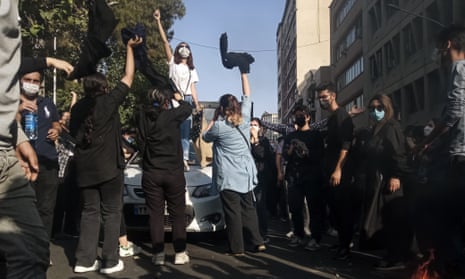Three Iranian Labor Activists Sentenced To Prison For May Day Protests
October 24, 2022
Three prominent Iranian labor activists have been found guilty of charges related to their union activities and handed prison sentences.
The Islamic Revolutionary Court of Tehran sentenced teachers union activists Jafar Ebrahimi, Rasul Bodaghi, and Mohammad Habibi to cumulative prison sentences of four years for illegal assembly and collusion and one year for propaganda against Iran.
The three were arrested by security agents on April 30, just ahead of demonstrations that were held in several cities on May Day, which coincided with Teachers' Day in Iran.
They were also accused of coordinating the protests with French teachers' union official Cecile Kohler and her partner, Jacques Paris, whom Tehran has tried to link to protesting Iranian teachers.
The arrests were largely seen as an attempt to discredit the rallies and increase pressure on the Iranian teachers' union to stop the protests.
Iranian officials have accused the two French nationals of "entering the country to sow chaos and destabilize society."
Iranian teachers -- along with pensioners and workers from other sectors -- took to the streets across the country over the summer to demand better pay and working conditions.
The verdict comes at a time when security forces are trying to suppress widespread anti-government protests in cities across the country sparked by the death in custody of 22-year-old Mahsa Amini, who was arrested for "improperly" wearing a head scarf.
UN human rights experts have expressed concern about the "violent repression" of civil society in Iran, including union members and teachers arrested for protesting low or unpaid wages and poor working conditions.
At the same time, pensioners and other groups have been protesting against the poor economic situation in the country, blaming the government for spiraling inflation, high unemployment, and failing to deliver on pledges to increase wages and improve living conditions.
The government's response to the protests has been arrests, violence, and repression of demonstrators.



:quality(70)/cloudfront-eu-central-1.images.arcpublishing.com/thenational/3VS247DDSLJL4XHPREIVMWNAYI.jpg)

:quality(70):focal(2465x1687:2475x1697)/cloudfront-eu-central-1.images.arcpublishing.com/thenational/7NYDU7DFROLQXYZFWD43OEJP64.jpg)
:quality(70)/cloudfront-eu-central-1.images.arcpublishing.com/thenational/DEBFD43YRUW63D6DH3TLRANY74.jpg)
:quality(70)/cloudfront-eu-central-1.images.arcpublishing.com/thenational/KVY62T4Y2XSGZZX4METLV5TIOA.jpg)
:quality(70)/cloudfront-eu-central-1.images.arcpublishing.com/thenational/WVKGHGYEUQ5DWJ6TARE4JRQGKI.jpg)
:quality(70)/cloudfront-eu-central-1.images.arcpublishing.com/thenational/AYII7SSHDF6NE62QPFIEZ7EDNY.jpg)
:quality(70)/cloudfront-eu-central-1.images.arcpublishing.com/thenational/4JA7IXXLRR6KJJICD4OAYV2YKQ.jpg)
:quality(70)/cloudfront-eu-central-1.images.arcpublishing.com/thenational/MLDTTF7XJDONJJR6EMZVN7MJUI.jpg)
:quality(70)/cloudfront-eu-central-1.images.arcpublishing.com/thenational/NGMZZNKJP2EZZ355VXYNGFTLJM.jpg)
:quality(70)/cloudfront-eu-central-1.images.arcpublishing.com/thenational/7M5T5AXQCNLVNW5DA5DABERFLA.jpg)
:quality(70)/cloudfront-eu-central-1.images.arcpublishing.com/thenational/HFWMYURCCHC2MHWCQUOG2IA2FU.jpg)
:quality(70)/cloudfront-eu-central-1.images.arcpublishing.com/thenational/ULQ3ITGZLYMCGGHPOJWBA3B56Q.jpg)
:quality(70)/cloudfront-eu-central-1.images.arcpublishing.com/thenational/KENKLCEIYGNL5RR6DLPRTTPQEQ.jpg)
:quality(70)/cloudfront-eu-central-1.images.arcpublishing.com/thenational/D2KE6DIRG4N44DJVYGQ25OTUPY.jpg)
:quality(70)/cloudfront-eu-central-1.images.arcpublishing.com/thenational/KM466NCMX7RASWVJTQESOQVRIQ.jpg)
:quality(70)/cloudfront-eu-central-1.images.arcpublishing.com/thenational/ZU4AQICJV4AQRK3CPI3NP4A2RQ.jpg)
:quality(70)/cloudfront-eu-central-1.images.arcpublishing.com/thenational/FD5ONLHZUSSVSTARCIAKSSFE7I.jpg)
:quality(70)/cloudfront-eu-central-1.images.arcpublishing.com/thenational/5JWLKFBB47PAH4L2JLBX3W32JA.jpg)
:quality(70)/cloudfront-eu-central-1.images.arcpublishing.com/thenational/5RVKY7ADYK2VDM5SM46R56RJIQ.jpg)
:quality(70)/cloudfront-eu-central-1.images.arcpublishing.com/thenational/YRN6AB37YV3RUIDTX2J7ESMV64.jpg)
:quality(70)/cloudfront-eu-central-1.images.arcpublishing.com/thenational/G43LTUGEVCVYT2NZLYZQSI2SQA.jpg)
:quality(70)/cloudfront-eu-central-1.images.arcpublishing.com/thenational/R4L5RELW6R6WXTHVMFGCVOGRVY.jpg)
:quality(70)/cloudfront-eu-central-1.images.arcpublishing.com/thenational/ESODKSPUNTH4HPNMERS74OU5EM.jpg)
:quality(70)/cloudfront-eu-central-1.images.arcpublishing.com/thenational/J25VZCASCWRFMFOVQMHWURJ2VQ.jpg)
:quality(70):focal(2813x1645:2823x1655)/cloudfront-eu-central-1.images.arcpublishing.com/thenational/CQPVQEMLM3FR6ZBTDN6ZKNMNIY.jpg)
:quality(70)/cloudfront-eu-central-1.images.arcpublishing.com/thenational/ECXEURYUN3OCFAS272PKH7LTS4.jpg)
:quality(70)/cloudfront-eu-central-1.images.arcpublishing.com/thenational/SD57J7QRJ7FXXPD3LAQZJRHOLQ.jpg)
:quality(70):focal(1966x1129:1976x1139)/cloudfront-eu-central-1.images.arcpublishing.com/thenational/VIJC6V6ENJM22LBQR6M2VEFC2A.jpg)
:quality(70)/cloudfront-eu-central-1.images.arcpublishing.com/thenational/BFKV6SHD6CXT43WT5QYYJINMOU.jpg)
:quality(70)/cloudfront-eu-central-1.images.arcpublishing.com/thenational/IQ54NTCQNDRH2DCYDTNY3VRWVQ.jpg)
:quality(70)/cloudfront-eu-central-1.images.arcpublishing.com/thenational/ZZUR435TE2FZNVEZ4ZH2EYS3NE.jpg)
:quality(70)/cloudfront-eu-central-1.images.arcpublishing.com/thenational/KAFYESEHZTYYMZPGYZIZHXAGXY.jpg)
:quality(70)/cloudfront-eu-central-1.images.arcpublishing.com/thenational/GYJKL5DFAYXB6RYCBI2AWBXBHQ.jpg)
:quality(70)/cloudfront-eu-central-1.images.arcpublishing.com/thenational/PHMTPNUC4OTDXCC6UFJFWHQO5U.jpg)
:quality(70)/cloudfront-eu-central-1.images.arcpublishing.com/thenational/3DU7GY3FN233I2ZB3NWDJXOJVM.jpg)
:quality(70)/cloudfront-eu-central-1.images.arcpublishing.com/thenational/3EZTDCMCR2CFF4UE377OCD7W2Y.jpg)
:quality(70)/cloudfront-eu-central-1.images.arcpublishing.com/thenational/HHZJVK4WGQ3P4ZT4L4MVXUQ3CY.jpg)
:quality(70)/cloudfront-eu-central-1.images.arcpublishing.com/thenational/DAHDA63Q5F6QUVJVHKTOX737PA.jpg)
:quality(70)/cloudfront-eu-central-1.images.arcpublishing.com/thenational/73SGXKCTOG7WQPBIWXDUV4T3SM.jpg)
:quality(70)/cloudfront-eu-central-1.images.arcpublishing.com/thenational/N6LAI37ZBTJWUG7IWXX6FYEQFQ.jpg)
:quality(70)/cloudfront-eu-central-1.images.arcpublishing.com/thenational/ELGES6NJBVQ5E74UIHV4EF46SU.jpg)
:quality(70)/cloudfront-eu-central-1.images.arcpublishing.com/thenational/QV3B57IMWNMGZ525LIPWCULFD4.jpg)
:quality(70)/cloudfront-eu-central-1.images.arcpublishing.com/thenational/KFPMS4OB2WY4PRHDUEF6XONC6U.jpg)
:quality(70)/cloudfront-eu-central-1.images.arcpublishing.com/thenational/QPSAH3PMJSE4JTPRK44ZY2SHQ4.jpg)
:quality(70)/cloudfront-eu-central-1.images.arcpublishing.com/thenational/OBAP7MHRVVEBYP6LNNASZV4VOE.jpg)
:quality(70)/cloudfront-eu-central-1.images.arcpublishing.com/thenational/FFBEVPXYKVAP3A22HPD2HQY7NE.jpg)
:quality(70)/cloudfront-eu-central-1.images.arcpublishing.com/thenational/ZMYXYXW7WB3B5XTNICYKDIEOFM.jpg)
:quality(70)/cloudfront-eu-central-1.images.arcpublishing.com/thenational/5F3HCBVF7AZOVBDFTZGSHLTHNE.jpg)
:quality(70)/cloudfront-eu-central-1.images.arcpublishing.com/thenational/BQSX4PKBALK2DIJ6H3UV27EZD4.jpg)
:quality(70)/cloudfront-eu-central-1.images.arcpublishing.com/thenational/4P3FEQYWQHFOVEBPJCIH7NDDUU.jpg)
:quality(70)/cloudfront-eu-central-1.images.arcpublishing.com/thenational/U2BH3OADFCDCXFQPDPI3R2GXVA.jpg)
:quality(70)/cloudfront-eu-central-1.images.arcpublishing.com/thenational/6DFNM45VAEIOL5PX5RL5UQOJSY.jpg)
:quality(70)/cloudfront-eu-central-1.images.arcpublishing.com/thenational/44XYCQMP3CJW4UOYT7O5IM74IE.jpg)
:quality(70)/cloudfront-eu-central-1.images.arcpublishing.com/thenational/E7GV52NKR4ENNYSZISYAVW6MOA.jpg)
:quality(70)/cloudfront-eu-central-1.images.arcpublishing.com/thenational/DYVVQNQ47AIKXNGJPM5ANLNTCY.jpg)
:quality(70)/cloudfront-eu-central-1.images.arcpublishing.com/thenational/3IRYTOW3QO5KXUFQBMDMCPZBYA.jpg)
:quality(70)/cloudfront-eu-central-1.images.arcpublishing.com/thenational/53KYO4AXOBWVSUUOFCILYURRP4.jpg)
:quality(70)/cloudfront-eu-central-1.images.arcpublishing.com/thenational/HNWX372SQSJROJABYV3RB6YUMU.jpg)
:quality(70)/cloudfront-eu-central-1.images.arcpublishing.com/thenational/UFQFTMCAINHI72SST2M7Y3Z6KI.jpg)
:quality(70)/cloudfront-eu-central-1.images.arcpublishing.com/thenational/OUJYMALVSNOJVYFKHWQZQUU6OE.jpg)
:quality(70)/cloudfront-eu-central-1.images.arcpublishing.com/thenational/23M7KPBWIH4UIDWUFPT5FDHEBI.jpg)
:quality(70):focal(4308x2058:4318x2068)/cloudfront-eu-central-1.images.arcpublishing.com/thenational/NG5PFZMEEUAPOJTRNWQU62TLL4.jpg)
:quality(70)/cloudfront-eu-central-1.images.arcpublishing.com/thenational/OIEF73BAC5NSD5OSLTPVITMMDI.jpg)
:quality(70)/cloudfront-eu-central-1.images.arcpublishing.com/thenational/XBJ62PSVOALQLW5VDJ323C4XIA.jpg)
:quality(70)/cloudfront-eu-central-1.images.arcpublishing.com/thenational/HMBSYGWQCINICPEFJ6NWRQL6YE.jpg)
:quality(70)/cloudfront-eu-central-1.images.arcpublishing.com/thenational/A2PT36CI55VLFRZXQM3C6NYDCQ.jpg)
:quality(70)/cloudfront-eu-central-1.images.arcpublishing.com/thenational/BSQD45GUNLQ3V6QQSV5MOYC5H4.jpg)
:quality(70)/cloudfront-eu-central-1.images.arcpublishing.com/thenational/PAZNYOCPJMXFUPAHGRGYXQIQNI.jpg)
:quality(70):focal(5660x1809:5670x1819)/cloudfront-eu-central-1.images.arcpublishing.com/thenational/KHUFYOLQH63KKABEQVTBTWXSRU.jpg)
:quality(70)/cloudfront-eu-central-1.images.arcpublishing.com/thenational/NAKXQW4GD2IHHV6FOC3QKYURGM.jpg)
:quality(70)/cloudfront-eu-central-1.images.arcpublishing.com/thenational/KUA77AUAG4FVT462QTB7TZ5M5Y.jpg)